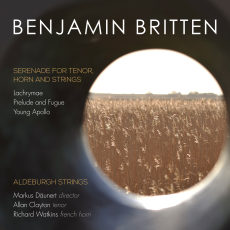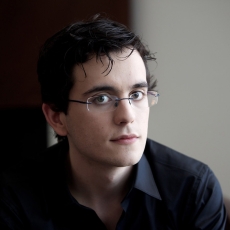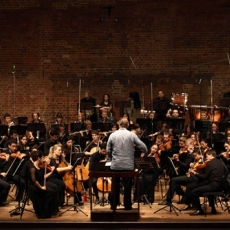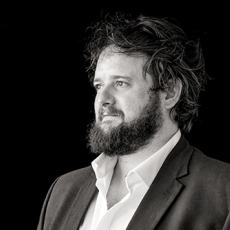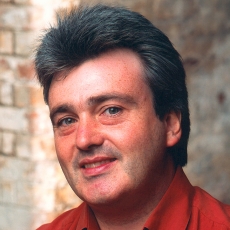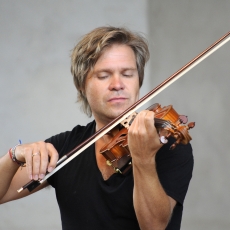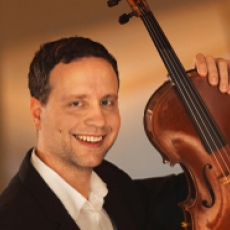Aldeburgh Strings - Britten: Serenade - MusicWeb International
This release offers a unique combination of
works. Lachrymae and the Prelude and Fugue have appeared
together on two independently issued Virgin discs under Iona Brown and
Christopher Warren-Green, as well as on a Nimbus CD conducted by William
Boughton. Meanwhile Yuli Turovsky on Chandos has combined Lachrymae
and Young Apollo. The Serenade for Tenor, Horn and Strings,
however, almost invariably comes coupled with other vocal works by Britten,
most commonly the other Peter Pears-inspired song-cycles Les
Illuminations and Nocturne.
Whether this compilation arose as a result of careful planning or serendipity
is not entirely clear. As the recording dates show, the various items were
recorded on three separate occasions over a two-and-a-half-year period, in
association with residential courses and concerts organized under the auspices
of Aldeburgh Music's Britten-Pears Young Artist Programme. The young musicians
are trained by eminent members of several of Europe's major orchestras, who
function both as tutors and as section leaders: the leader/director here,
Markus Däunert, is for example the concertmaster of the Mahler Chamber Orchestra,
and the viola soloist and section leader Máte Szücs is principal viola with the
Berlin Philharmonic. According to the booklet's list of the members of the
Aldeburgh Strings, they normally number 26 players, though only nine actually
appear in all of the four works featured on the disc. That said, one does not
notice any real discrepancies in performance style or quality, and still fewer
in the recorded sound, which - with the exception of what comes across as
rather close miking of the horn soloist in the Serenade - is
outstandingly good.
The programme begins with the least known work, Britten's somewhat bizarre
‘fanfare' for solo piano and strings, Young Apollo, which was commissioned by
the Canadian Broadcasting Corporation in 1939 and then withdrawn by Britten
after just two performances. Mervyn Cooke's excellent booklet note tells us
that this decision was inspired less by musical factors than by personal ones -
namely those arising out of the composer's spectacularly ill-timed infatuation
with the German national Wulff Scherchen (son of the conductor Hermann). This
homo-erotic background perhaps helps explain the subject-matter of the piece,
which depicts how Apollo becomes the new god of beauty and ‘throws off his
mortal form in a terrific convulsion', before standing before us as ‘the new,
dazzling, Sun god, quivering with radiant vitality'. Be that as it may, the
Aldeburgh Strings and the young French pianist Lorenzo Soulès perform the
work's various ‘convulsions' and glissandi with considerable virtuosity and
vividness.
For this listener at least, the composer's level of inspiration is much higher
in Lachrymae, written in 1950 for viola and piano, but
performed here - as often nowadays - in a highly successful adaptation for
viola and string orchestra made by Britten in the last year of his life.
Britten, always a great exponent of variation form, here bases his piece on
John Dowland's song ‘If my complaints could passions move', which, as was
sometimes Britten's way, is given in its original form only at the work's
conclusion. Without evincing any very marked level of interpretative
originality, Szücs and the orchestra certainly have the measure of Lachrymae
protean moods, and perform it searchingly and sensitively. Both here and
elsewhere on the disc, one is struck by the beauty and security not least of
their quiet playing - a virtue which comes to the fore also in the gorgeously
lyrical Prelude that follows. The accompanying Fugue,
meanwhile, is a contrapuntal tour de force written originally for the
Boyd Neel String Orchestra, and tossed off here with notable verve and aplomb.
In Lachrymae and the Prelude and Fugue the Aldeburgh Strings
already face stiff competition from numerous fine recordings; but this is
particularly the case with the disc's longest work, the 1943 Serenade
for Tenor, Horn and Strings. Here the rising star Allan Clayton
comes up against a veritable ‘Who's Who' of British tenor-dom, stretching from
Peter Pears via the likes of Robert Tear and Philip Langridge to such more
contemporary exponents as John Mark Ainsley or Ian Bostridge. Clayton has a
lyrical tenor of great beauty and a considerable range of tone colour, though I
was slightly surprised to be disturbed occasionally by his vibrato when using
head voice and by his aspirated runs in Ben Jonson's ‘Hymn' - not that he is
exactly alone in that. Clayton's diction is excellent, though at one point he
waxes bizarrely Scottish when telling us of the fire that ‘will burn thee to
the bare bane' in the anonymous ‘Dirge'. As such he relishes such opportunities
as he gets for story-telling (as in the last two stanzas of Charles Cotton's
‘Pastoral'), and he conveys a potent sense of mystery in the second verse of
Tennyson's ‘Nocturne' and the entirety of Blake's ‘Elegy'. This latter song is
probably the highlight of Clayton's cycle, along with his moving and
intelligent rendering of the concluding Keats Sonnet. Overall I could perhaps
best explain his approach by placing it somewhere between the relatively
direct, golden-voiced eloquence of John Mark Ainsley (with David Pyatt and
Nicholas Cleobury on EMI) and the more astringent, imaginative and at times
interventionist manner of Philip Langridge (with Frank Lloyd and Steuart
Bedford on Naxos, formerly Collins).
